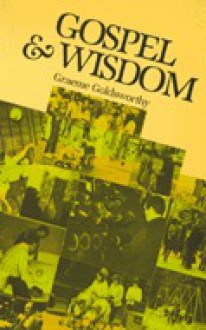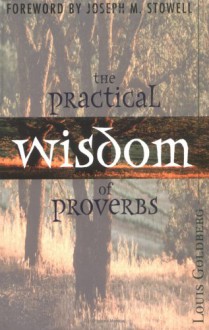
I must admit that I actually found this book to be quite dry and boring. It is not because I find the topic boring, but rather that by looking at the Bible, particularly the easier parts of the Bible (which include the books of wisdom), and in particular Proverbs, in an academic fashion has the habit of destroying the life and the spark that I get from the Bible. Secondly, much of what he says in this book does little to add to add to our understanding of the Bible, and in a way seems to have little real practical application. I guess, when I approach the wisdom books, I am looking for practical application, but in the end, the application is not just already there, but for those of us who go to church of a Sunday, we tend to hear it anyway. However, it does not necessarily mean that it is a bad book, and there are some interesting aspects to it, however I found that it was too long and seemed to drag on a lot to the point that I was glad to get to that final page.
While Goldsworthy is right in pointing out that the Bible warns us against worldly wisdom, however Goldsworthy warns us against treating anything that does not come from the Bible as being worldly wisdom and thus to be ignored. For instance, technical skills are not mentioned in the Bible, nor does the Bible teach us technical skills, however that does not mean that we should not learn technical skills. What the Bible is warning us against is the basis upon which the wisdom is built. What the Bible says is that wisdom that comes from a biblical foundation is far more reliable than wisdom that is built upon a foundation of atheism or paganism. Once again, I do not believe that means that we should ignore the ancient texts, particularly since the texts that have survived have survived for a reason, but rather when we read then we need to be aware of the foundations of these texts. Basically, simply because the wisdom is spoken by a human does not mean that it should be ignored. There are many wise humans out there that say some very wise things that do not necessarily come from the Bible, but what it is saying is that we need to be aware that there is a form of wisdom that seeks to remove God from the picture so as to create a foundation upon which we can justify their own selfish desires. Even the apostle Paul, who condemns the teachings of the Roman Philosophers, leaned upon the teachings of some of the earlier Greek philosophers in his discourses. Further, we are also told that Moses was trained in all of the wisdom of the Egyptians, but did not necessarily say that he discarded his learning.
We see this problem arising today from two modern camps, that of the Athiests and that of the Fundamentalists. To me, both approaches are fraught with danger. The Athiest's reject God and try to establish a morality on a basis of what they consider to be right or wrong, however there is no objective foundation upon which they can establish that morality, and as such endless debates as to what is right and what is wrong comes about. As such, we get strange ideas being proposed such as 'Greed is Good' which in turn sends the world into economic chaos. On the other hand we have the Fundamentalist's rejecting reason to the point where they claim that because Jesus did not like divorce, they condemn women who leave abusive relationships as sinners, or make absurd claims that if a woman becomes pregnant because of rape or incest, then they must have enjoyed it.
Goldsworthy spends most of the book looking at this idea of how wisdom developed throughout the Bible, and to be honest, I do not necessarily agree with him. Granted, we have books which looks at the development of Greek Philosophy from the Seven Sages to Socrates, however much of this is based upon fragmented documents and speculation. The same is the case with Goldsworthy's thesis that Wisdom and understanding was developing and evolving from the fall right up unto Jesus Christ. Granted, Jesus is the representative of the evolved man, however it is my position that up until Christ, humanity was devolving, and it was the appearance of Christ on Earth, and his death and resurrection, that turned humanity around. However, even then, the wisdom of the Bible, and the wisdom that was pronounced by Christ, was once again hijacked, manipulated, and twisted to wicked men's own evil purposes. However, he is correct when he points out that the Tree of the Knowledge of Good and Evil was not denying knowledge, but rather it was saying that we do not need to know evil, because all we needed to know was that obedience was the good life, and not to obey was evil. What the tree did was opened our eyes to what exactly was evil, and in a sense, it was an understanding and a knowing that living for oneself was beneficial to one self. What the tree was not doing, was denying us knowledge of philosophy, literature, or scientific research.
This is the same with the Deuteronomic Law, and that was that it set boundaries, but it did not deny us knowledge. It allowed us to express ourselves artistically, but warned us against worshipping this art. It allowed up to explore ideas of animal husbandry, but set boundaries on where we to go. However, it also opened up ideas of justice, but was once again a means of which we could measure our decisions, as opposed to creating a strict means of living life. In a way, the law operated like the civil law countries of Europe, where each case is decided on its own merits and is guided by the legal code that governs the nation.
I guess his conclusions are modelled on this understanding of the law, because by the time we get to Solomon, while the law is still in place, we have a greater understanding of how we are to live and how we are to conduct ourselves in society. This is how the book of Proverbs is constructed. It is advice on how to live the good life and warnings against traps we might fall into. He does hammer on about the idea of the fear of God for too long, but I guess I have understood that the notion of fear in this context has more to do with respect and acknowledgement of authority that it has to do with being scared and living in terror. I guess the idea that he is concluding with also evolves around the issue of guidance. Guidance is one of those topics that we all want to know about, and I guess we understand that there are things we do not do (such as murder, rape, or theft) but there are other things that God is strangely silent on (who should we marry, what job should we do). The answer to that is, that is your choice. God never wanted to make us robots, and that is why he gave us choice. How we go about it may be a different story, but many of us fear choice, and that is why we hang on to that false notion of seeking guidance from God. Look at the book of Proverbs, in fact look at the whole Bible, and understand the boundaries that have been set, and the make our own choices. Of course, maintain your relationship with God, but remember, he gave you choice, use it, explore it, and remember, Love the Lord your God with all your heart, mind, soul, and strength, and love your neighbour as yourself.
I want to finish off though with something he said about the book of Job. Now in a way the whole book seems to be allegorical in context, though I still hold the opinion that it was based on a real man and real events. However, the allegorical aspect suggests that Job is the faithful godly man who simply has a run of bad luck and is trying to work out what it happened to him. Of the characters that enters the picture, we can see that they represent types of people. We have the wife who is the type of person who encourages you to blame others for your misfortunes and simply wallow in your misery (curse God and die). Then we have the man who is a very spiritual person, who suggests that because God is incapable of inflicting suffering on people for the pleasure of it, it them must have something to do with a Karmic backlash. The next friend falls back on the traditional approach while the third is simply the one of little faith. However, all of them point their fingers at Job and indicate that he must have done something to deserve it. God does not see it that way, but further, does not actually provide him with any answers. Despite this, Job maintains his faith and is rewarded.
The allegorical aspect reflects the life of the righteous man, in that he will suffer in life, but by living through that suffering, which includes having to deal with a bunch of morons who cannot understand that suffering comes about because of the world we live in, and that it is not necessarily some concept of karma biting us back, that those who persevere, in the end, will survive, and come upon much more wealth, in the form of eternal life.


 Log in with Facebook
Log in with Facebook 









